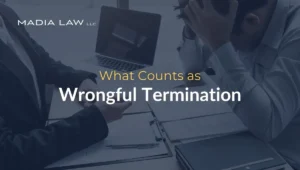
Being fired usually damages one’s own personal confidence, reputation, and sense of justice, especially when the reason is unfair or unlawful. You often wonder what really happened, and whether your rights were violated.
Wrongful termination occurs when an employer breaks the law while ending a worker’s employment. This includes firing someone due to discrimination, retaliation, or contract violations.
- Discrimination includes being fired based on race, gender, religion, age, disability, or sexual orientation.
- Retaliation involves firing an employee for reporting misconduct, harassment, or illegal practices.
- Contract violations include ending employment in ways that breach written agreements or implied promises.
At Madia Law LLC, we represent Minnesota workers affected by wrongful termination. We help “salt of the earth” people of the Midwest who have been unfairly fired for doing the right thing, speaking up, standing out, or refusing to stay silent. If you suspect your termination was unlawful, act immediately.
What Does “Wrongful Termination” Actually Mean?
Wrongful termination means an employer ends a worker’s job in violation of employment law. This includes firings based on discrimination, retaliation, or breaches of contract.
In Minnesota, employment is generally at-will, which allows employers to end employment for almost any reason. However, there are legal boundaries. When a firing violates discrimination laws, punishes protected actions, or breaks a valid agreement, it becomes unlawful termination.
Unlawful termination is recognized as wrongful dismissal under both state and federal law.
How At-Will Employment Works in Minnesota
At-will employment in Minnesota allows employers to fire employees at any time, for almost any reason. Employers are not required to provide advance notice or justification.
However, this right is not unlimited. A firing becomes unlawful when it violates any of the following:
- Anti-discrimination laws such as firing based on race, gender, religion, age, or disability.
- Retaliation protections such as firing someone for reporting illegal conduct or unsafe conditions.
- Employment agreements such as firing in breach of a written or implied contract.
Example: Terminating an employee after they report unsafe working conditions violates workplace safety and retaliation laws.
What Makes a Termination “Unlawful”?
A termination becomes unlawful when it breaks legal protections that exist to safeguard employee rights. This includes:
- Discrimination: Firing someone because of protected characteristics
- Retaliation: Punishing employees for reporting illegal activity, harassment, or safety violations.
- Contract violation: Ending employment in breach of an existing agreement.
Example: If a worker is fired after filing a harassment complaint or after disclosing a serious medical condition, that action may qualify as wrongful termination.
Unlawful termination is not about unfairness. It requires a violation of established legal rights under state or federal law.
For a legal consultation, call 612-349-2729
Common Myths About Wrongful Termination
Wrongful termination laws are often misunderstood. These 8 myths often confuse workers trying to analyze what qualifies as an illegal firing.
- Myth 1: Employers can fire you for any reason.
- Fact: In Minnesota, employment is at-will, but firing someone for discriminatory or retaliatory reasons violates the law. Employers are not required to explain a firing, but they ultimately must have proof that their cause was legal.
- Myth 2: Only workers with written contracts are protected.
- Fact: Legal protections apply to all employees. Even without a contract, you are protected from unlawful termination.
- Myth 3: You have no rights during probation or as an independent contractor.
- Fact: Job protections start from day one. Probation periods and contractor labels do not cancel legal rights, especially in cases of misclassification.
- Myth 4: Discrimination is the only basis for a wrongful termination lawsuit.
- Fact: Discrimination is just one cause. Retaliation, whistleblower punishment, breach of public policy, or contract violations also qualify.
- Myth 5: If you quit, you can’t sue.
- Fact: Resigning due to a hostile or retaliatory environment may count as constructive discharge, legally similar to being fired.
- Myth 6: Retaliation is too hard to prove.
- Fact: Timing, documentation, and witness statements often establish intent. These cases are provable when you collect strong evidence.
- Myth 7: If it feels unfair, it must be illegal.
- Fact: Not all unfair firings are unlawful. To qualify as wrongful termination, the reason must violate legal protection.
- Myth 8: Employers always settle to avoid bad press.
- Fact: Some do, but many fight wrongful termination claims, especially if documentation is weak and they have well-paid corporate legal teams. Build your case carefully.
Check the facts before accepting your termination. If the firing involved illegal motives, you may have a valid legal claim.
6 Legal Reasons a Termination Becomes Wrongful
Certain employment terminations are illegal under federal and Minnesota law. Below are six legal reasons a firing qualifies as wrongful termination.
Retaliation After Engaging in Protected Activity
Firing an employee for engaging in protected activity is retaliation and is unlawful. Protected actions include:
- Reporting unsafe work conditions.
- Filing complaints about harassment or discrimination.
- Reporting wage theft or unpaid overtime.
- Cooperating with a workplace investigation.
Examples of retaliation:
- Being fired shortly after reporting harassment.
- Being demoted after requesting FMLA leave.
- Having hours cut after submitting a safety complaint to OSHA.
These actions are illegal and qualify as wrongful termination under retaliation laws.
Termination Based on Workplace Discrimination
Discrimination-based firing violates federal and Minnesota laws. Termination is illegal when based on:
- Race, color, or national origin
- Religion or creed
- Gender, pregnancy, or gender identity
- Sexual orientation
- Age (40 or older)
- Disability
Examples:
- Firing someone shortly after disclosing pregnancy.
- Letting someone go after a religious time-off request.
These firings violate Title VII of the Civil Rights Act and the Minnesota Human Rights Act.
Breach of an Employment Contract
Breaking a valid contract qualifies as wrongful termination. This includes:
- Written agreements (e.g., a one-year term).
- Verbal promises made during hiring.
- Implied contracts from handbooks or consistent policies.
Examples:
- An employee who was promised a year of work was fired in two months.
- A handbook guarantees warnings before termination, but none are given.
Violating a contract gives legal grounds for a wrongful termination lawsuit.
Firing Due to Harassment or Hostile Work Conditions
Terminating someone after harassment complaints is illegal. This includes:
- Constructive discharge (when an employee quits due to hostile conditions).
- Retaliatory firing after reporting harassment.
Examples:
- A worker reports racial jokes, is demoted, and then terminated.
- A supervisor makes sexual comments, and the worker is later fired for “performance”.
These patterns show unlawful termination tied to workplace harassment.
Whistleblower Retaliation by Employers
Whistleblower protections make retaliation illegal. Laws cover reports about:
- Fraud or financial misconduct.
- Health and safety violations.
- Illegal public harm practices.
Signs of whistleblower retaliation:
- Firing soon after a report.
- Changing the reason for dismissal.
- Only the reporting employee is punished.
These firings violate whistleblower laws and qualify as wrongful termination.
Violations of State or Federal Employment Laws
Firing someone for exercising their legal rights is unlawful. Protected rights include:
- Taking FMLA leave.
- Receiving overtime pay.
- Refusing unsafe work under OSHA.
Examples:
- Fired after requesting family medical leave.
- Let go after reporting unpaid overtime.
- Dismissed for refusing to work in dangerous conditions.
Each case represents a direct violation of employment law and qualifies as wrongful termination.
If your termination involved any of these six violations, you have a valid claim. Document the facts and speak to an employment lawyer to protect your rights.
Click to contact our personal injury lawyers today
7 Legal Steps to Take After Being Wrongfully Terminated
Wrongful termination requires a legal response. If you were fired for reasons that violate discrimination, retaliation, or contract laws, these steps help you take action.
First, Understand Your Legal Employment Rights
Employees have legal protection under state and federal law, regardless of job type, status, or background. These protections apply during employment, termination, and workplace disputes.
Key laws include:
- ADA (Americans with Disabilities Act): Safeguards workers with disabilities from discriminatory treatment or dismissal.
- EEOC Enforcement: Upholds laws against bias, harassment, or retaliation based on protected characteristics.
- FMLA (Family and Medical Leave Act): Guarantees job protection during qualified family or medical leave periods.
- OSHA (Occupational Safety and Health Administration): Defends workers who report safety hazards or violations.
These employment rights prevent illegal firings and protect you before and after dismissal.
Second, Gather All Relevant Documentation and Evidence
You must collect documentation that supports your wrongful termination claim. The correct records provide proof of discrimination, retaliation, or contract violations.
Collect materials such as:
- Emails or text messages
- Written complaints to supervisors or HR
- Performance evaluations or warnings
- Termination letters or exit paperwork
Coworker testimony is powerful evidence. Speak with colleagues who witnessed retaliation or mistreatment before your dismissal. Their accounts help confirm your experience.
Create a detailed timeline. Include every date tied to complaints, reviews, warnings, or policy violations. Timelines clarify your legal position.
Third, Consult an Experienced Wrongful Termination Attorney
You must consult an employment lawyer for wrongful termination to evaluate your legal claim. Early legal advice protects your rights and clarifies your next steps.
Many employment lawyers offer case reviews to evaluate your situation.
Bring these materials to your attorney meeting:
- Termination letter or separation notice.
- Employment contracts or policy handbooks.
- Written documentation, notes, or complaints.
- Names of witnesses and their roles.
An attorney will assess the facts, explain your rights, and determine whether your termination violated the law. This step is critical for filing a formal claim.
Fourth, File a Complaint with the EEOC or MDHR
To pursue your wrongful termination claim, file a complaint with the EEOC or the Minnesota Department of Human Rights (MDHR).
- File with the EEOC for federal claims involving discrimination, retaliation, or harassment.
- File with the MDHR for violations under Minnesota’s Human Rights Act.
You must submit your complaint within 180 to 300 days (about 6-10 months) from your termination date. Late filings may disqualify your case.
Once filed, the agency takes one of three actions:
- Investigates the complaint.
- Seeks a resolution through settlement.
- Issues a “right to sue” letter so you can take your case to court.
Filing with the proper agency is a mandatory step in any wrongful termination claim involving discrimination or retaliation.
Fifth, Explore Mediation or Informal Dispute Resolution
Many wrongful termination cases settle outside of court through alternative resolution methods. These include:
- Mediation with a neutral third party.
- Negotiation between your attorney and the employer.
- Agency-led dispute resolution or settlement facilitation.
Resolutions often involve:
- Back pay for lost wages.
- Removal of negative performance records.
- A negotiated separation agreement with favorable terms.
Resolving a wrongful termination claim through mediation avoids trial and often leads to faster, confidential outcomes.
Sixth, Consider Filing a Wrongful Termination Lawsuit
A wrongful termination lawsuit is a formal legal action filed when an informal resolution fails. Your attorney evaluates your case and determines if litigation is the best strategy based on the available evidence and desired outcome.
A lawsuit often results in:
- Compensation for lost wages or emotional distress.
- Reinstatement or a negotiated settlement.
- A legal judgment confirming the employer’s wrongdoing.
The litigation process includes:
- Filing the lawsuit in court.
- Discovery and pre-trial motions.
- Trial and final judgment if no settlement occurs.
Legal action requires time, preparation, and evidence, but it can provide strong remedies for wrongful termination.
Seventh, Learn About Compensation and Potential Settlements
Successful wrongful termination claims result in compensation or negotiated settlements. These legal remedies can include:
- Back pay: Wages lost from the termination date to the judgment or settlement.
- Front pay: Estimated future income lost due to the wrongful firing.
- Emotional damages: Compensation for stress caused by discrimination or retaliation.
- Reinstatement: Rare, but possible in certain legal cases.
The value of a wrongful termination settlement depends on several key factors:
- Strength of the legal claim and available evidence.
- Quality of supporting documentation.
- Employer’s willingness to resolve the dispute.
- Career impact, emotional harm, and lost future earnings.
Understanding your compensation options helps you make informed legal decisions.
Complete a Case Evaluation form now
5 Key Legal Protections Available in Minnesota
Minnesota employees are protected by five essential labor laws that prevent wrongful termination, retaliation, and illegal dismissal. These protections apply if you’re reporting safety violations, taking family or medical leave, or facing discrimination at work.
Each law gives workers the legal right to challenge unlawful termination and demand accountability.
Below are five legal protections that every Minnesota employee must know.
Equal Employment Opportunity Commission (EEOC) Protections
The EEOC protects workers from termination based on discrimination or retaliation. Federal law prohibits firing an employee based on race, sex, religion, national origin, age (40+), pregnancy, or disability.
The EEOC also investigates retaliation. If you report discrimination or assist in an investigation, your employer cannot legally punish or fire you.
You must file an EEOC complaint within 180 to 300 days of the termination date, depending on your state and the type of claim. Filing early improves your chances of a timely resolution.
Minnesota Department of Human Rights (MDHR) Enforcement
The MDHR enforces the Minnesota Human Rights Act, which protects employees from discriminatory or retaliatory termination. These protections apply to terminations based on race, gender, disability, sexual orientation, religion, and other protected characteristics.
The Minnesota Human Rights Act process includes:
- Filing a complaint online or by mail.
- Agency-led investigation of the claim.
- Mediation between employee and employer.
- Issuing a right-to-sue letter if legal action is appropriate.
MDHR protections often mirror EEOC guidelines but apply under Minnesota state law.
Occupational Safety and Health Administration (OSHA) Rules
OSHA rules protect employees from termination after reporting unsafe conditions or refusing dangerous work. Federal law prohibits retaliation against workers who:
- File safety complaints.
- Report workplace injuries or hazards.
- Cooperate with an OSHA investigation.
- Refuse work that violates safety regulations.
Firing someone for raising a safety concern qualifies as wrongful termination under OSHA’s whistleblower protections. These rules help ensure that reporting danger does not risk your job.
Family and Medical Leave Act (FMLA) Requirements
FMLA provides up to 12 weeks of job-protected leave for qualifying medical or family reasons. This includes:
- Personal serious health conditions.
- Childbirth or adoption.
- Caring for a spouse, child, or parent with a serious condition.
Firing or retaliating against an employee for requesting or using FMLA leave violates federal law. Termination after approved leave is considered a breach of FMLA protections and may lead to a legal claim.
These protections apply to all eligible employees, regardless of job title or pay level.
Americans with Disabilities Act (ADA) Protections
The ADA protects employees from wrongful termination based on a disability or perceived medical condition. It prohibits employers from firing workers due to health-related limitations.
The law also requires employers to provide reasonable accommodations, including adjusted schedules or accessible workspaces, unless doing so causes significant difficulty or cost.
Denying accommodations or terminating someone due to a disability violates federal ADA protections. These cases often result in legal action for wrongful dismissal.
Frequently Asked Questions About Wrongful Termination
Can I Sue My Employer for Wrongful Termination?
Yes. You can sue if your employer fired you for illegal reasons, including discrimination, retaliation, or violation of protected rights. Your claim must include evidence and meet legal deadlines under state or federal law.
Do I Need a Contract to Prove Wrongful Termination?
No. A written contract is not required to file a wrongful termination claim. Many claims are based on violations of labor law, not contract terms. You can still have a valid case without a formal agreement.
How Are Damages Calculated in Wrongful Termination Cases?
Damages include back pay, future income (front pay), lost benefits, emotional distress, and legal costs. The final amount depends on your evidence, the impact on your career, and the strength of the legal claim.
What if I Was Fired Without a Written Explanation?
In Minnesota, employers aren’t required to give either a written or verbal reason for termination. However, if your firing followed a protected action, like filing a complaint, requesting leave, or asking for accommodations, it may qualify as wrongful termination.
Can Undocumented Workers File Wrongful Termination Claims?
Yes. Undocumented workers are protected by labor laws in many situations. You can file a wrongful termination claim for illegal firing based on discrimination, retaliation, or workplace safety complaints.
How Long Do I Have to File a Wrongful Termination Case?
You have between 180 and 300 days to file with the EEOC or MDHR, depending on the type of claim. Lawsuits must follow the wrongful termination statute of limitations.
Why Choose Madia Law LLC for Your Wrongful Termination Case
Madia Law LLC represents Minnesota employees in wrongful termination, retaliation, and workplace discrimination cases. We focus exclusively on Minnesota employment law, and we fight to recover what workers lose when they’re fired illegally.
Experienced Legal Representation in Employment Law
Madia Law LLC has experience in wrongful termination and workplace rights cases. We’ve litigated against major employers and recovered compensation for hundreds of workers in urban and rural areas across Minnesota.
Our firm focuses entirely on employment law. We don’t split our attention and focus across legal practice areas, we 100% specialize in labor law and holding employers accountable.
Personalized Approach to Each Case
We evaluate each case based on your unique facts, timeline, and employment records. Your situation gets direct attention from our legal team from start to finish.
No outsourcing. No handoffs. We manage your case in-house and personalize every legal step to fit your goals.
Trusted by Clients for Proven Results
We’ve proudly secured major settlements and court victories for Minnesota workers in need. Clients trust us in high-stakes situations because we deliver consistent results.
Our stellar customer reviews reflect our communication, responsiveness, and successful outcomes. When it comes to employment law, we’re trusted and dedicated advocates for workers across the Gopher State.
“Madia Law helped me when everyone else looked the other way. I was dealing with a pregnancy discrimination case when my former employer provided false allegations about my work ethic and I was terminated from my employment. In this case I was one woman facing a giant and I was ready to give up until I came across Madia Law’s webpage. Within minutes of submitting my case request I received a call and found comfort in knowing that I wasn’t alone. They are heaven sent and I am entirely grateful!”
— Christina Vescio
Strong Advocacy for Employee Rights
Madia Law stands up for Minnesota workers who are fired for speaking out, asking for fair pay, or refusing illegal practices. We handle retaliation and discrimination cases that threaten your career and dignity.
We pursue justice, not just closure. Our team is your Minnesota “North Star” guiding you and working tirelessly to restore your rights and help you recover damages.
How to Get Started with Madia Law LLC
We make it easy to connect and learn where your case stands. Call us at (612) 49-2729 or submit your information through our website form.
Once we hear from you, we will:
- Review the facts of your situation and any relevant documents
- Assess whether your issue aligns with our legal focus.
- Explain your legal options clearly, with no pressure and no obligation.
If your case qualifies, we will endeavor to represent you with honesty, focus, and the utmost legal knowledge and skills.
Call 612-349-2729 or complete a Case Evaluation form






